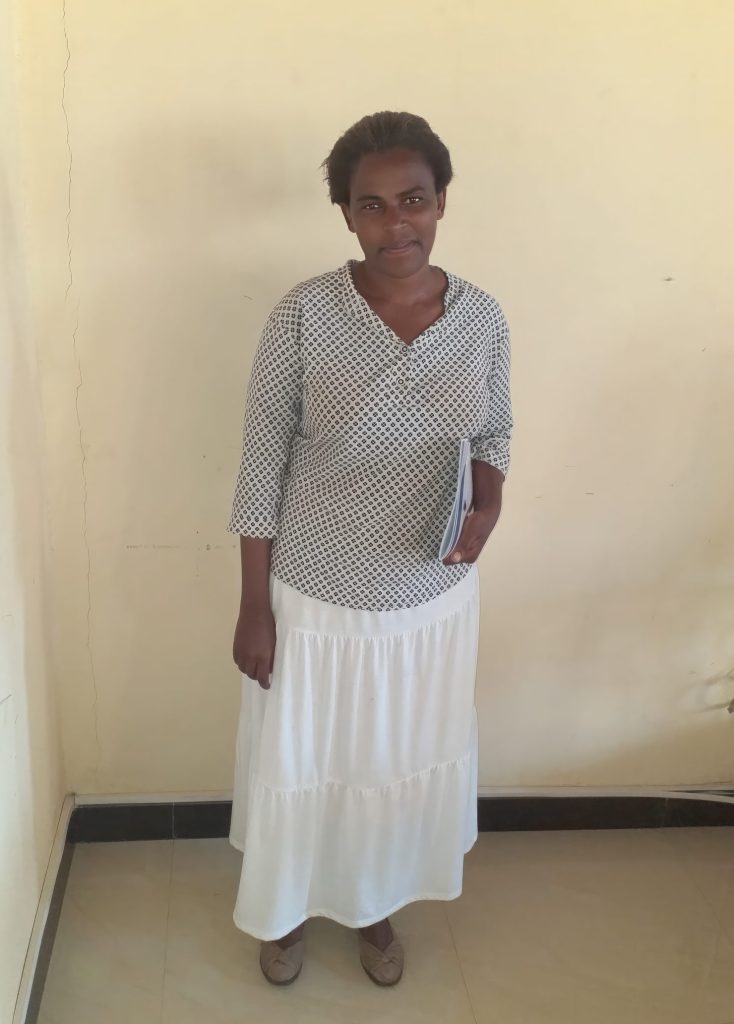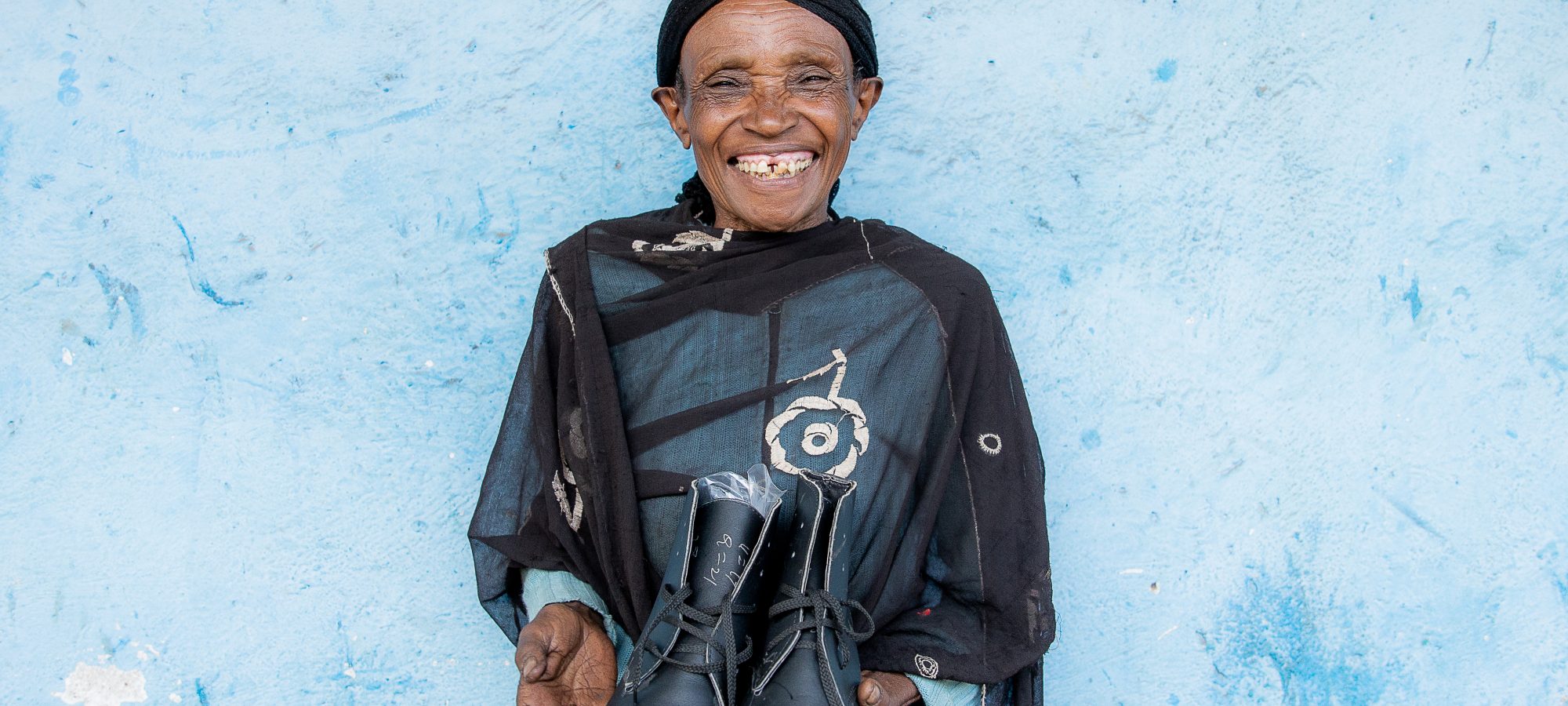Header photo by Genaye Eshetu
Podoconiosis, also known as a non-filarial elephantiasis, is highly prevalent in the southwestern and central highlands of Ethiopia. The disease results from continued exposure of people’s bare feet to soils of volcanic origin. The region formerly known as the Southern Nations, Nationalities, and People’s Region (SNNPR) in the south bears the highest prevalence nationally (8.3 percent). The region is mostly made up of rural farmland, and those living and working in these areas do not always have access to protective footwear, which is the most effective means of preventing podoconiosis.
This debilitating disease causes disfiguring and disabling swelling (lymphoedema) of the lower leg. Due to widespread stigma and discrimination, podoconiosis is not only a health concern, but also psychological, social and economic problem. Lymphoedema from podoconiosis is more common among women than men (with a male to female ratio of 0.7 to 1), given that gender imbalances may influence women’s access to resources, including shoes and socks.

Aberash is a public health officer working in the Sodo Zuria district, where she is responsible, alongside a team of health workers, for the care of patients with podoconiosis. Thanks to a three-year project, Happy Feet: Strengthening Community Based Podoconiosis Prevention and Control in Ethiopia, being led by Malaria Consortium and funded by Malaria Consortium US, Aberash now feels she can improve the quality of life of her patients who have podoconiosis.
Through the project, Aberash has received training on lymphoedema morbidity management and disability prevention (MMDP) for podoconiosis patients. She has since cascaded this training to her colleagues and health extension workers (HEWs). Her team has conducted an exercise to map people with podoconiosis in their health centre catchment area — this exercise led to 91 podoconiosis patients receiving MMDP at the facility, with a focus on treatment, within five months.
The stigma and discrimination surrounding podoconiosis is largely due to a lack of knowledge about the cause and preventive methods in society. The disease is mistaken as transmittable from person-to-person, hereditary or a curse. Those with the disease also feel self-stigma and isolate themselves from their community. People with severe swelling can no longer do their day-to-day activities and become unproductive, leading them to economic hardship and poverty.
Aberash said, “We were unable to provide psychosocial and economic rehabilitation (PSER) due to a lack of technical knowledge and skills, though it is a very important component to improve the psychological, social and economic situation of podo patients. I was able to provide counselling to some extent, but it was insufficient because I had not previously attended PSER training. However, I am aware that podo-affected individuals can benefit from both clinical and psychosocial assistance.
Fortunately, thanks to Malaria Consortium, I was able to receive [this] training. I learned about informational gaps, psychological problems, social relationship problems, and economic gaps, as well as how to provide solutions for each gap based on the capabilities of health centres and health experts. As a result, this programme improved my knowledge and skills in counselling, listening, problem identification, and problem-solving discussions.
This training has changed my attitude toward podo-afflicted individuals. I now feel more affection for them as they need services beyond health, as the disease is also a psychological, social and economic problem. I play a significant part also in developing individuals’ psychosocial and economic rehabilitation elements and bringing them into the quality of life.”
In Aberash’s district, podoconiosis prevalence is above the national average (over 10 percent). In 2020, Malaria Consortium conducted a formative assessment to determine the capacity of health workers to adequately detect, manage and report podoconiosis. The assessment identified significant gaps in capacity due to a lack of regular in-service training from the primary healthcare system. Communities, health workers and volunteers demonstrated a considerably low level of awareness and knowledge of podoconiosis, with many highlighting a lack of access to information.
The Happy Feet project aims to accelerate control of podoconiosis by creating universal access to better quality services to help prevent and manage the disease. The project closely works with the government health system at all levels, including primary health care unit of project districts. Using Ethiopia’s established Health Extension Programme, the project will support HEWs to better detect, refer and follow up on home-based management of lymphoedema.
The project aims to benefit a total population of 208,155 (104,119 women and 104,036 men). By 2025, the goal is to contribute to a reduction in the rate of new podoconiosis cases to less than one percent in both project districts as per the national target
Read more in our learning brief: Happy Feet: Initiating and integrating low-cost podoconiosis and lymphoedema management services in primary healthcare
Esey Batisso Gabore is a Project Manager at Malaria Consortium Ethiopia
